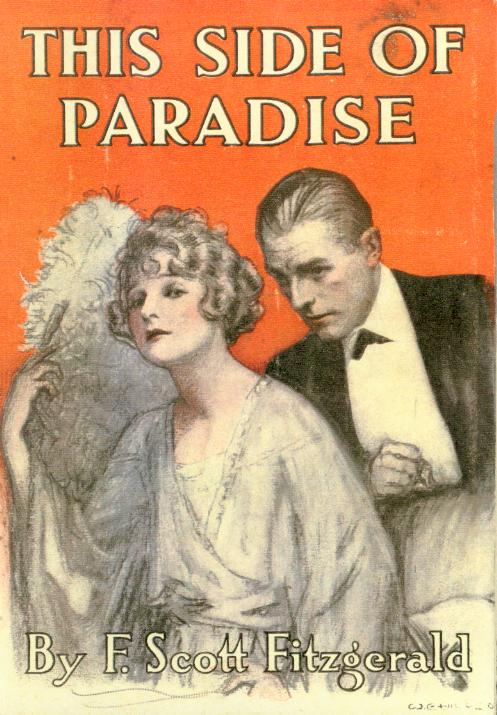 I was hanging out at the BF's apartment all this long weekend, and since he's deep in grad school hell, we spent most of the weekend with our books in our respective corners, ignoring each other. I read "The Book of Salt," "Slaughterhouse-Five," half of "The Hobbit," and today's book, "This Side of Paradise" by F. Scott Fitzgerald (1920).
I was hanging out at the BF's apartment all this long weekend, and since he's deep in grad school hell, we spent most of the weekend with our books in our respective corners, ignoring each other. I read "The Book of Salt," "Slaughterhouse-Five," half of "The Hobbit," and today's book, "This Side of Paradise" by F. Scott Fitzgerald (1920).I blazed through it in a day and a half, tossed it to the side, and announced, "That was a stupid ending. All that happened was--" Except I didn't end my statement with two hyphens. I kept going. And the BF was pissed.
"I wanted to read that," he said quietly, turning away from me like an angry cat. "I haven't read it yet and I didn't want to know what happened."
Cardinal rule of responsible reading: don't give away the damn ending.
It was his book, too. I read his book and spoiled the ending for him. That's like showing up at someone's house, eating all their food, wiping your mouth on the cat, and bailing without even helping do the dishes. Or wash the cat.
How was the book itself? Prrreeettttyyy good, but not great. I can't deny that Fitzgerald has talent, and the fact that he wrote "This Side of Paradise" when he was but a tender lad of twenty-three is astounding. The book is about a young man named Amory Blaine, and tells of his birth and upbringing, his prep school days, his college days, and the few years follow college. We learn about his friends and lovers, the books he reads, and his search for himself.
Fitzgerald drew me into this story like Edith Wharton does. They both write so piercingly about the American upper-class, explaining hugely complex, labyrinthine social structures and morays with brevity and humor. I was fascinated by Fitzgerald's description of Princeton College life in the 1910s: the mad scramble for popularity and the inner social circle; the complete lack of regard for actual scholarship (boys who studied too hard were "grinds" and never popular or important); and the way these uber-privileged white men exercise their privilege and get ready to rule the country. There's also this really weird bit in the middle where Amory meets the devil--like, the actual Devil, Lord of Hell, First Among the Fallen, etc.--and then it's never mentioned again. Ever. You have to admire that kind of audacity.
However, you can tell that this book was written by a twenty-three-year-old. It's padded, pretentious, and attaches far too much importance to the types of feelings and events that for children are all-encompassing and catastophic, but for adults are merely the vagaries and bullshittiness of life that you learn to shrug off as you get older. I think there's a lot of value in an actual twenty-three-year-old writing about the emotional life of twenty-three-year-olds, because at least he's being honest, and this book is nothing but painfully honest. But Jesus, kid, so some girl dumped you for a richer man, you'll get over it (and hi, obvious inspiration for "The Great Gatsby," didn't expect to see you here!).
Also, there's a lot of bad teenage poetry in this book. Painfully bad teenage poetry, with rhymes and everything. I skipped over most of it, because the poetry doesn't advance the plot at all and is written in this leftover Victorian style that clearly hasn't felt the influence of Modernism yet. This makes it tonally at odds with the rest of the rather Modernist novel, in addition to being boring and irrelevant to the story.
Also also, casual racism, sprinkled here and there throughout, and on Big Island Rachel's Books, racism knocks you down at least one letter grade.
"This Side of Paradise" by F. Scott Fitzgerald: C.
Recommended for fans of the writer who are devouring his repertoire. All others should just re-read "The Great Gatsby."
No comments:
Post a Comment